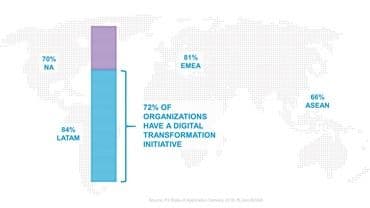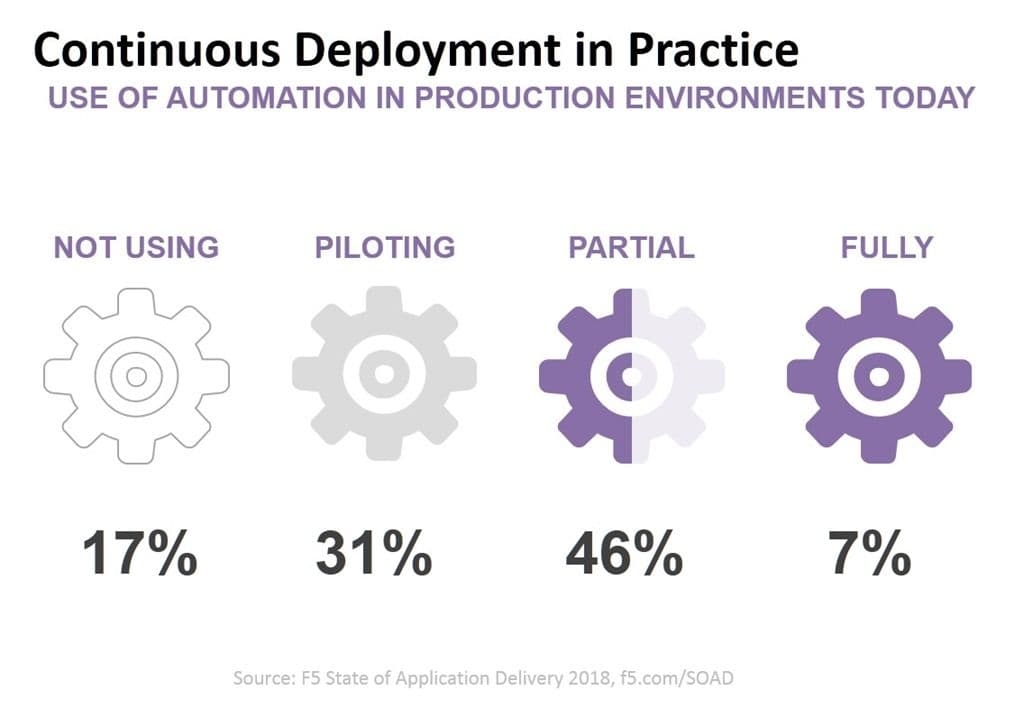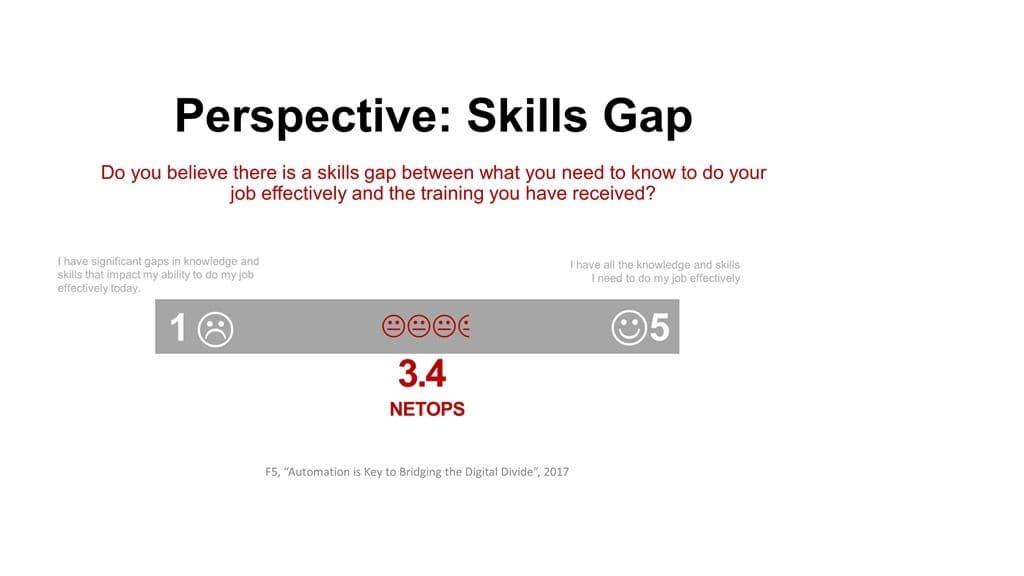
- Digital Transformation initiatives are a forcing function on automation in production. If you don’t lead on automation, you will follow someone else – if you’re lucky.
- Developers have a leg up on coding/scripting/integration skills. But NetOps have the network know-how they are missing.
- Organizations in every industry, across the globe, are ramping up their use of automation in production.
- NetOps are more likely to cite a lack of training/skills as a barrier to automation of production pipelines. The Super-NetOps program addresses that challenge.
Digital transformation may be an overused, overhyped, and often abused description but it’s also a very real movement driving organizations away from paper and manual processes to operate more fully in the digital economy. Nearly three in four (72%) of organizations in our State of Application Delivery 2018 are operating under a digital transformation initiative. What is often missed in all the “look at what X brand has done thanks to digital transformation” stories is all the sweat and tears that went into preparing the data center to support the latest gizmo, gadget, or app.
Because let’s face it, apps still communicate with back-end services whether via API or URI, JSON or XML, WebSockets or web sites. And that means there’s a network underpinning every app, every IoT device, every single communication that takes places on the Internet ever second of every day.
How important is that? Consider the Internet Association estimates that the contribution of activity via the Internet “to the US GDP is approximately 3.11%, putting it at approximately the same size as the Automotive industry, which has historically been estimated at approximately 3.0-3.5% of GDP in the US (Center for Automotive Research, 2015).” The association further noted that the Internet contributed approximately 5.3% of GDP in G-20 economies and 5.7% of the EU GDP in 2016. That’s not equipment, that’s activity. Supply chains, retail sales, financial transactions. All that economic activity ultimately requires apps and APIs, which means your network.
Stability and speed of networks is vital to support such a growing load. That includes the networks that make up the backbone, the interconnects, and the data center. That last one is what we’re focusing on today, because you can impact that one the most.
You can, but you might not be. Increasingly, developers are influencing and sometimes making decisions that directly impact the network. Because they’ve already adopted agile methodologies, and embraced DevOps. They’re moving faster than the network can keep up. They’re pushing into production (or out to the cloud) out of sheer need to move faster. That’s troubling, because the skills you need to be a successful network engineer or architect are not the same a developer needs. The two skill sets have traditionally been as different as night and day. But that’s changing.
If NetOps are going to continue to have an impact on the network they are going to need to gain some developer fu.
That’s what we intend to do with a movement some call NetOps 2.0 or DevNetOps, but we call Super-NetOps.
The premise, no matter what you call it, is the same: embrace DevOps principles, apply its methodologies, and adopt automation as a strategic approach to enabling continuous deployment into production environments.
That means automating minor and major configuration changes to apps, application services, and the network itself. It means learning how to work with a REST API, and how to use repositories like Git to manage and collaborate on the scripts and templates necessary to provision and configure everything in the data path.
It also requires an understanding of the core tenets of DevOps: CAMS. It means recognizing that Culture matters, Automation is a means to an end, and Measurements are meant to be Shared as well as used to improve process and performance.
It is, in my experience, easier to teach a networker to code than it is to teach a developer how to network. Neither is impossible – and there are always outliers - but it’s rare to find a developer who wants to learn about networking. A great deal of the success of cloud and containers lies in the fact that it obfuscates the complexity of network configuration by abstracting it into simple services that developers can consume in bite-sized chunks. Without having to dive into the intricacies of why or how it works.
They shouldn’t have to. Their job is to turn bits and bytes and logic into amazing applications. It is NetOps job to make the network hum like a well-oiled machine and pump out packets with the speed of a Formula-One racer. I’m a developer with an affinity for the network and I know enough to know that I don’t know enough to automate the network as well as a true network engineer.

That’s why you, network aficionado, must do it for me – and the millions of developers like me. Because if you don’t, someone else will. The old saying might be “Lead, Follow, or Get out of the way” but with the approach of the digital transformation train that’s become just “Lead or Get Out of the Way.”

There are reasons why some organizations aren’t employing automation right now. One of them is an existing skills gap. There are a variety of “developer” skills that NetOps need to really do automation right, and the fact is that they themselves aren’t all that confident they have those skills.
That’s one of the drivers behind Super-NetOps. It’s not just a free training course on “how to automate a BIG-IP”. We have a ton of that on DevCentral right now. It’s about building a firm foundation and acquiring the skills and knowledge NetOps needs to automate BIG-IP and beyond. The core skills are applicable to the extensive set of network and application services that provide APIs and templates today that could be used to automate and orchestrate in production environments. Just like the developer teams need from you. Often it’s just a case of not knowing how (or where) to start.
That’s what we’re aiming to answer with Super-NetOps. You need the training and skills to extend your expertise and experience into the next generation of data centers – and the cloud. We’re here to say “we’ve got your back. Here are the skills you need to lead the movement so you don’t get swept aside by it.”
The future is very much automated. And there’s no one better suited to automating the network than the engineers and architects that know how to keep the engine of the Internet economy running.
There are no more excuses for not getting started. So sign up. Sign in. Slip into something comfortable and get going. There’s never a better day to start automating than today.
About the Author

Related Blog Posts

Why sub-optimal application delivery architecture costs more than you think
Discover the hidden performance, security, and operational costs of sub‑optimal application delivery—and how modern architectures address them.

Keyfactor + F5: Integrating digital trust in the F5 platform
By integrating digital trust solutions into F5 ADSP, Keyfactor and F5 redefine how organizations protect and deliver digital services at enterprise scale.

Architecting for AI: Secure, scalable, multicloud
Operationalize AI-era multicloud with F5 and Equinix. Explore scalable solutions for secure data flows, uniform policies, and governance across dynamic cloud environments.

Nutanix and F5 expand successful partnership to Kubernetes
Nutanix and F5 have a shared vision of simplifying IT management. The two are joining forces for a Kubernetes service that is backed by F5 NGINX Plus.

AppViewX + F5: Automating and orchestrating app delivery
As an F5 ADSP Select partner, AppViewX works with F5 to deliver a centralized orchestration solution to manage app services across distributed environments.
F5 NGINX Gateway Fabric is a certified solution for Red Hat OpenShift
F5 collaborates with Red Hat to deliver a solution that combines the high-performance app delivery of F5 NGINX with Red Hat OpenShift’s enterprise Kubernetes capabilities.
